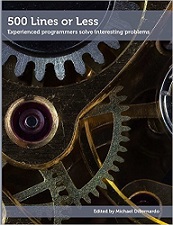
|
FreeComputerBooks.com
Links to Free Computer, Mathematics, Technical Books all over the World
|
|
- Title: 500 Lines or Less: Experienced Programmers Solve Interesting Problems
- Author(s) Amy Brown, Greg Wilson
- Publisher: lulu.com (June 28, 2016); eBook (Creative Commons Licensed)
- License(s): CC BY 3.0
- Paperback: 478 pages
- eBook: HTML and PDF
- Language: English
- ISBN-10: 1329871278
- ISBN-13: 978-1329871274
- Share This:

|
As we pointed out in The Architecture of Open Source Applications, architects look at thousands of buildings during their training, and study the critiques of many more. But most software developers only ever get to know a handful of programs well - usually programs they wrote themselves.
This book provides you with the chance to study how 26 experienced programmers think when they are building something new. The programs you will read about in this book were all written from scratch to solve difficult problems. A web server, a pedometer, a Python interpreter, a web-based spreadsheet, and many more applications are written, in 500 lines of code or less, and described by their creators so that you can learn from their insights and their mistakes.
It focuses on the design decisions that programmers make in the small when they are building something new. The programs you will read about in this book were all written from scratch for this purpose (although several of them were inspired by larger projects that the authors had worked on previously).
About the Authors- Amy Brown worked in the software industry for ten years before quitting to create a freelance editing and book production business. She has an underused degree in Math from the University of Waterloo.
- Computer Programming
- Free and Open Source Software (FOSS)
- Software Engineering Principles and Practices

- 500 Lines or Less: Experienced Programmers Solve Interesting Problems
- The Mirror Site (1) - PDF
- Source Code
-
 Competitive Programmer's Handbook (Antti Laaksonen)
Competitive Programmer's Handbook (Antti Laaksonen)
This book is an introduction to computer programming using using any of a variety of programming languages, including C++, C#, Java, JavaScript, Python, and Swift for writing programmes, and to solid, fundamental programming principles.
-
 Principles of Algorithmic Problem Solving (Johan Sannemo)
Principles of Algorithmic Problem Solving (Johan Sannemo)
The algorithmic approach to solving problems in computer technology is an essential tool. This book presents a readable, entertaining, and energetic book that will motivate and challenge students to open their minds to the algorithmic nature of problem solving.
-
 A Practical Theory of Programming (Eric C.R. Hehner)
A Practical Theory of Programming (Eric C.R. Hehner)
This book explores aspects of programming that are amenable to mathematical proof. The author describes a programming theory which is much simpler and more comprehensive than the current theories to date.
-
 Programming Fundamentals - A Modular Structured Approach
Programming Fundamentals - A Modular Structured Approach
This book is an introduction to computer programming using any of a variety of programming languages, including C++, C#, Java, JavaScript, Python, and Swift, for writing programmes, and to solid, fundamental programming principles.
-
 Structure and Interpretation of Computer Programs using JavaScript
Structure and Interpretation of Computer Programs using JavaScript
This book introduces the reader to central ideas of computation by establishing a series of mental models for computation. It has had a dramatic impact on computer science curricula over the past decades. Examples are implemented using the JavaScript.
-
 How to Design Programs: An Introduction to Programming
How to Design Programs: An Introduction to Programming
This introduction to programming places computer science at the core of a liberal arts education. Unlike other introductory books, it focuses on the program design process, presenting program design guidelines.
-
 Elements of Programming (Alexander Stepanov, et al)
Elements of Programming (Alexander Stepanov, et al)
The book shows that algorithms implemented in a real programming language, such as C++, can operate in the most general mathematical setting. For example, the fast exponentiation algorithm is defined to work with any associative operation.
-
 Concepts, Techniques, and Models of Computer Programming
Concepts, Techniques, and Models of Computer Programming
This innovative book presents computer programming as a unified discipline in a way that is both practical and scientifically sound. The book focuses on techniques of lasting value and explains them precisely in terms of a simple abstract machine.
-
 OOP: Learn Object Oriented Thinking and Programming
OOP: Learn Object Oriented Thinking and Programming
It teaches programming according to the Architecture First methodology which reacts at the companies' complaints that the school graduates are usually good in coding, but bad in software architecture.
-
 Programming and Mathematical Thinking: Discrete Math & Python
Programming and Mathematical Thinking: Discrete Math & Python
Starting at an elementary level, this book teaches about fundamental structures of discrete mathematics and many simple but powerful programming techniques using those structures.





